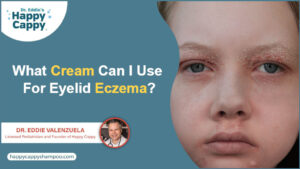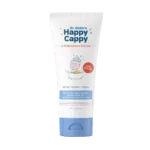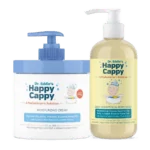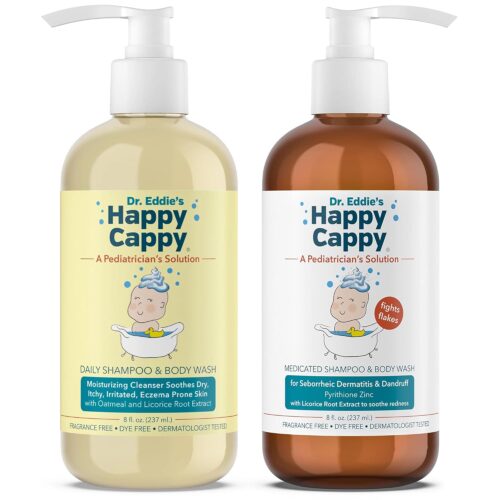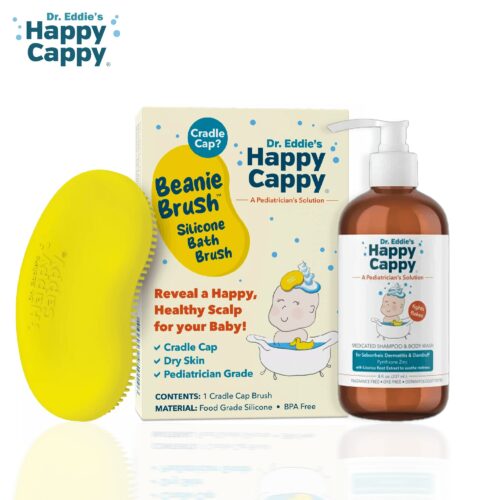Eczema is never fun, but there are better and worse places for a flare-up to occur. Your child’s arms and legs? Bearable and relatively easy to treat. Their eyelids fall solidly into the “worse” category.
Not only is the itchy, dry, cracking skin difficult to manage in such a sensitive area, but treatment risks medicine in the eye and the discomfort that can bring. Eyelid dermatitis isn’t common, but that’s no consolation if you suffer from it. We feel your child’s pain (and yours) and can help!
But before you start any treatment option, it’s important to determine the cause of your child’s eyelid eczema. Look for allergens that could be coming into contact with their eyes. These may indicate contact dermatitis, and removing the allergens could clear the problem.
However, if your child has a history of eczema, particularly on their face or neck, there’s a good chance you’re dealing with atopic dermatitis. In this case, a quality baby eczema cream applied two or three times a day will help protect the skin’s damaged moisture barrier, allowing it to stay healthy while blocking germs.
More about it later. First, let’s talk about what NOT to do.
Eyelid Eczema Treatments to Avoid
Prevention is the best medicine. Your baby or child likely has specific triggers that increase the chances of an eczema flare-up. You can avoid treating eyelid eczema altogether if you can steer clear of triggering conditions.
Of course, that’s not always possible, and sometimes, a flare-up will happen just because your baby’s skin decides to be stubborn. Doctors commonly prescribe topical corticosteroids for atopic dermatitis on other parts of the body. These reduce inflammation and calm overactive immune responses.
These aren’t a good option for the eyes, however. The compounds have a tendency to thin the eyelids and the skin surrounding them. If eczema cream isn’t enough to control the problem (and it often is), your doctor should closely monitor the situation and allow only short-term corticosteroid use.
Other than that, there are a few things that you should avoid to prevent the condition from worsening:
- Don’t scratch or rub your eyelids.
- Avoid using make-up on the eyes.
- Avoid using soap on your face.
- Don’t use any skincare product with harsh chemicals.
- Avoid using sunblock around the eyes.
- Don’t wash your eyes and face with hot water.
Treatment For Eyelid Eczema
-
Eczema Cream
Your child’s skin is sensitive in general, and their eyelids are doubly so. To reduce the chances of further irritation, choose a baby eczema cream that’s free of dyes, phthalates, parabens, and artificial fragrances and colors.
Apply at least twice daily. And moisturize their skin with eczema cream immediately after a bath or washing their face.
-
Eczema Shampoo
Bath time can further dry out the skin, so be sure to get rid of harsh soaps and switch to a body wash for eczema that’s dermatologist-tested to relieve dry, itchy, irritated, and sensitive skin. Eczema shampoo and body wash infused with natural ingredients that soothe irritated eczema skin are great options.
-
Avoid The Triggers
If a certain skincare product or irritant is the reason behind your eyelid dermatitis, then try avoiding it to soothe the symptoms and prevent future flare-ups.
-
Topical Steroids
In severe cases or when your condition is not getting better with the use of eczema cream, then the doctor or dermatologist may prescribe mild topical steroids (for a short period of time) and topical calcineurin inhibitors or crisaborole to apply to the eyelids to relieve the intense itching and irritation.
Eczema Cream For Your Eyelid Dermatitis
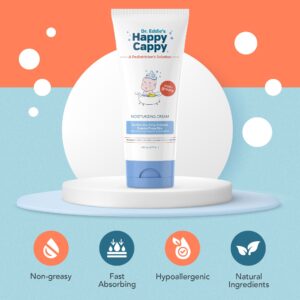
An eczema cream free from harsh chemicals like fragrances, dyes, paraben, and sulfate is the best option for sensitive skin that is prone to eczema. These chemicals can irritate the skin and further worsen the condition. Happy Cappy Moisturizing Cream for Eczema is free from all of these harsh chemicals.
It contains licorice root extract and glycerin–ingredients are known to be effective in soothing eczema-related redness and restoring the skin’s protective barrier.
Happy Cappy Moisturizing Cream helps soothe dry, itchy, irritated skin in babies, children, and adults. For best results, use it with Happy Cappy Daily Shampoo and Body Wash.
It’s worth noting that these products are great for adults who suffer from eczema if their skin is particularly sensitive. These products are safe and effective for the whole family.
FAQs
What can cause eczema on my eyelids?
Eczema on the eyelids is usually caused when the eyelids come in contact with some allergen or irritant or it can just happen.
Can foods cause eyelid eczema?
Eczema is not typically caused by food allergies. However, if you are very allergic to certain foods such as milk, nuts, and wheat and consumed those food items, eyelid eczema could be triggered.
Which moisturizer is best for eczema on the eyelids?
A clinically tested, fragrance-free, paraben-free, and sulfate-free moisturizer is best for eyelids. If you are experiencing eczema on the eyelids, using a moisturizer specially formulated for eczema-prone skin, such as Happy Cappy Eczema Moisturizing Lotion.

